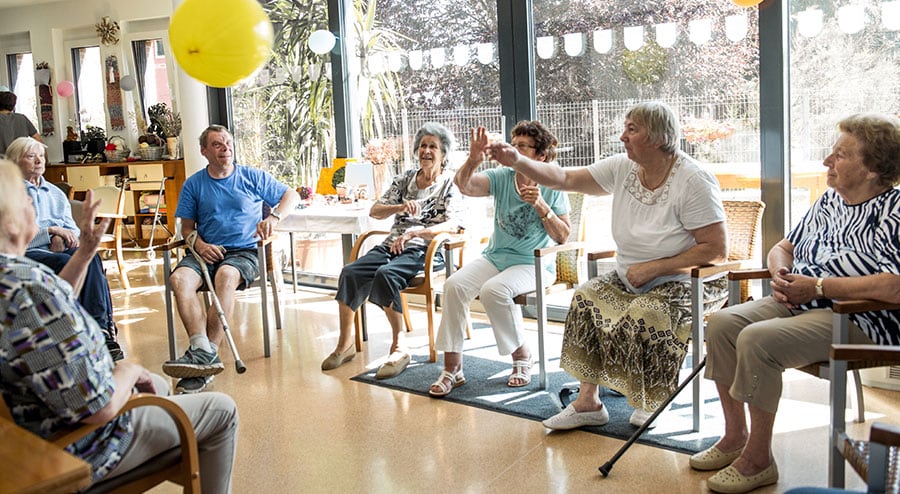Understanding Exactly How Assisted Living Sustains People With Dementia Care Demands
Aided living facilities are increasingly acknowledged for their essential role in resolving the complex treatment requirements of clients with dementia. Assisted Living. By providing a structured yet supporting setting, these centers not only advertise safety and security and well-being yet likewise promote a sense of autonomy through customized care plans. Furthermore, involving activities and socialization opportunities are important to improving cognitive function and emotional wellness. The nuances of just how these aspects engage to create a supportive neighborhood warrant closer evaluation, especially in understanding their long-lasting impact on citizens' high quality of life.
Summary of Mental Deterioration Care
Dementia care is significantly important as the occurrence of dementia-related problems climbs amongst maturing populaces. The condition can differ dramatically in its presentation, needing tailored treatment methods to meet individual demands.
Effective mental deterioration care involves a multidisciplinary strategy, including clinical, emotional, and social assistance. Health care professionals, caregivers, and relative should collaborate to produce a caring environment that promotes the health of people with mental deterioration. Secret elements of dementia treatment include personalized treatment plans, cognitive stimulation therapies, and behavior treatments intended at enhancing lifestyle.
In addition, it is important to recognize the emotional and emotional obstacles encountered by both individuals and caretakers. Education and learning and training for caregivers play a critical duty in fostering understanding and compassion, thus boosting interactions with those impacted by dementia. As the need for mental deterioration treatment remains to increase, the emphasis must stay on supplying caring, person-centered care that appreciates the self-respect and preferences of individuals coping with this problem.
(Dementia Care Charlotte)
Function of Assisted Living Facilities
Aided living facilities play an important function in supplying look after people with dementia, supplying an encouraging atmosphere that stabilizes freedom with the necessary aid. These centers are made to accommodate the one-of-a-kind needs of locals, promoting a feeling of area while guaranteeing safety and security and wellness.
In an assisted living setting, trained personnel provide continuous support, assisting with day-to-day activities such as showering, dressing, and medication administration. This level of treatment is important for people with mental deterioration, that may fight with these jobs as a result of cognitive decline. In addition, centers commonly include memory-enhancing programs and social activities tailored to stimulate cognitive performance and urge social communication.
The physical environment of assisted living facilities is additionally maximized for safety and security, including safe entryways, well-lit paths, and clear signs to help homeowners browse their environments. These areas foster a sense of belonging, lowering the sensations of isolation that people with mental deterioration might experience.
Personalized Care Program
To guarantee that each resident receives the most ideal care, personalized treatment strategies are vital in nursing home for individuals with dementia. These strategies are customized to fulfill the special needs, preferences, and difficulties dealt with by each local, advertising their self-respect and high quality of life.
The growth of an individualized treatment plan usually begins with a comprehensive assessment conducted by health care professionals. Assisted Living. This analysis reviews the individual's cognitive abilities, physical health and wellness, emotional well-being, and social choices. Input from family members and the resident themselves is crucial, as it gives important insights into their background, routines, and individual interests
Once the evaluation is total, a multidisciplinary team collaborates to develop a treatment plan that lays out specific objectives and interventions. This might consist of medicine management, daily living help, and behavioral strategies tailored to mitigate stress and anxiety or anxiety.
Routine testimonials and updates to the care plan guarantee it stays relevant as the individual's condition progresses. Memory Care. By prioritizing personalized care, assisted living facilities can improve the general wellness of homeowners with mental deterioration, fostering a setting that appreciates their individuality while addressing their treatment needs properly
Involving Tasks and Socialization
Engaging activities and socializing play an important duty in boosting the lifestyle for residents with mental deterioration in nursing home. These tasks are developed to promote cognitive function, advertise emotional wellness, and foster connections among locals. Organized programs, such as art treatment, songs sessions, and reminiscence therapy, offer chances for individuals to share themselves artistically while likewise activating favorable memories.
Socializing is similarly important, as it fights feelings of isolation and solitude that can accompany dementia. Group activities, including games, team trips, and common eating, motivate interaction and assistance citizens build helpful connections with peers and caregivers. This feeling of area not just enriches their daily experiences but also adds to a more steady emotional environment.
Furthermore, involving tasks can be tailored to private preferences and cognitive degrees, ensuring that each resident can take part meaningfully. By developing an atmosphere that prioritizes engagement and social interaction, helped living centers can dramatically improve citizens' total mental health and wellness, fostering a feeling of objective and belonging. Ultimately, these campaigns are vital elements of detailed dementia treatment, substantially impacting locals' overall wellness and joy.
Advantages of Area Support

In addition, area assistance promotes social communication, which is vital for cognitive and psychological health and wellness. Engaging with peers and joining team activities can enhance state of mind and urge memory, adding to a higher sense of belonging. This social interaction is vital, as solitude and isolation can exacerbate cognitive decrease.

(Memory Care Charlotte)
Final Thought
In verdict, assisted living centers offer as vital settings for people with mental deterioration, offering structured assistance that promotes both their website independence and safety and security. The implementation of personalized care plans makes sure that each homeowner's distinct demands are met, while engaging activities promote social communication and cognitive involvement.